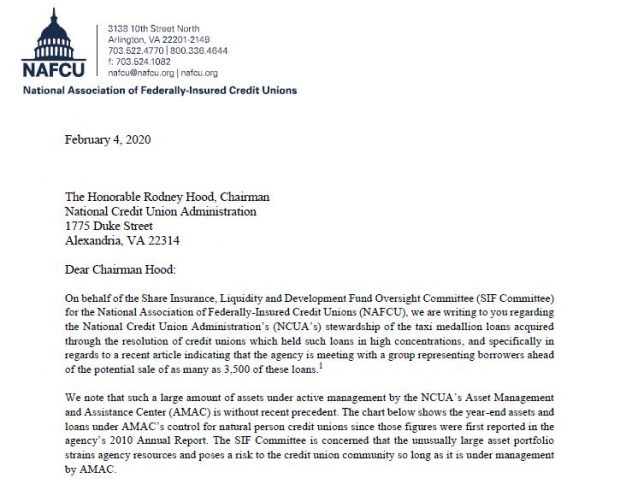 NCUA official seal. (Source: NCUA)
NCUA official seal. (Source: NCUA)
The NCUA should sell the taxi medallion loans as expeditiously as possible and for a fair price, NAFCU said Tuesday - ignoring pleas that any sale be delayed in order to help bail out medallion owners.
"The SIF Committee is concerned that the unusually large asset portfolio strains agency resources and poses a risk to the credit union community so long as it is under management by [the agency]," Curtis Long, NAFCU's vice president of research and chief economist, said in a letter to the agency on behalf of the trade group's share insurance fund committee.
Recommended For You
CUNA, New York's Democratic House members and New York City officials have asked the NCUA to delay medallion sales in an effort to help drivers burdened by large loans.
A city task force said last week that it wants to find private investors who would purchase the loans at a discount and then pass those discounts onto the drivers.
The task force said if the loans were sold at a discount at an auction, they might be purchased by someone who would not pass the discount onto drivers.
And they expressed fear that the agency might bundle some — if not all — of the medallions and sell them at auction.
 First page of NAFCU's letter to the NCUA.
First page of NAFCU's letter to the NCUA. The NAFCU letter did not address that issue but did state that the committee favors a quick sale of the medallions.
"NAFCU members have expressed questions and concerns relative to the factors NCUA will use to determine whether or not an offer represents fair pricing, given the rarity of these transactions in the open market," Long wrote.
He urged the agency to be transparent in its sales plans.
Long said as regulator and insurer, the NCUA must balance the goals of promoting safety and soundness for credit unions holding taxi loans and ensuring that the share insurance fund remains strong.
"In addition, there has been a larger public policy debate surrounding how to help the taxi-driver industry," Long wrote.
Meanwhile, a separate but related taxi medallion battle is occurring in San Francisco, which also has seen the value of taxi medallions plunge.
San Francisco Federal Credit Union has sued the city and city agencies, contending that they failed to live up to a deal to purchase medallion loans if the market for them dropped precipitously.
The city has asked for a summary judgement against the credit union, but credit union officials on Monday filed a response to that motion.
Credit union officials said several years ago, the city's transit agency had sought a lender to make medallion loans since drivers could not pay cash for the medallions. The credit unions made loans to 703 drivers, totaling more than $138 million.
The city has not sold any new medallions since 2016 and the credit union is now holding 171 foreclosed medallions.
The credit union currently holds almost $63 million in loans, according to court records.
Credit union officials said they believe the city made a commitment to purchase loans once the city stopped selling medallions and the partnership ended.
In asking for a summary judgement, the city's transit agency said it never guaranteed the price of the medallions against the ride-sharing services. Transit officials said they only agreed to buy back medallions if the program ended.
City officials said the program has not been terminated and that the transit agency has continued to try to revive the demand for taxis and medallions.
© Touchpoint Markets, All Rights Reserved. Request academic re-use from www.copyright.com. All other uses, submit a request to [email protected]. For more inforrmation visit Asset & Logo Licensing.






